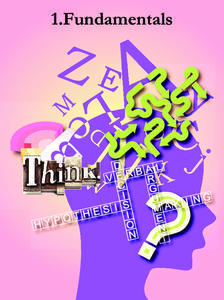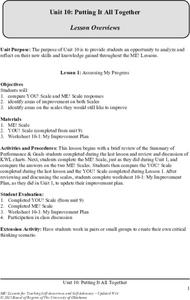Missouri Department of Elementary
Fatal Accident
While there may not be any ghostbusters in the neighborhood, there are plenty of emergency response agencies ready to give support if something is amiss. To that end, instructors invite a member of an emergency response agency to address...
Education Bureau of Hong Kong
Decision-Making
Designed to be included in the fourth lesson in the "Learning and Teaching of Critical Thinking Skills" series, this presentation models for viewers how to use the Decision Making worksheet to weight factors.
Education Bureau of Hong Kong
Decision-Making
Making decisions about things like what to do after high school can be a challenge. So many factors are involved. The decision-making worksheet in this resource helps to simplify the process by asking individuals to fill in a matrix for...
Education Bureau of Hong Kong
Mental Models
Critical to responsible decision making is becoming aware pre-conceived notions and biases that influence our perceptions. A colorful slide presentations asks viewers to consider these mental models that factor into their assumptions and...
Education Bureau of Hong Kong
Fundamentals of Critical Thinking
Analyzing arguments is key to critical thinking. Colorful slides teach viewers how to recognize the structure of an argument, the claims, and the validity of the evidence used to support an argument. Then, provided scenarios permit...
Education Bureau of Hong Kong
Fundamentals
"Fundamentals," the first lesson in a series of eight, introduces the basic concepts and strategies covered in a series of resources designed to teach high schoolers critical thinking skills. The worksheets and activities in this first...
Education Bureau of Hong Kong
Mental Models
Behaviors are often based on assumptions. That's the big idea in the third lesson of a series of critical think resources. Through a series of worksheets, learners examine the conscious and heretofore unconscious assumptions that...
Education Bureau of Hong Kong
Evaluating Casual Claims
Responsible decision making relies on the ability to a recognize, analyze, and evaluate claims. The worksheets and activities in this 32-page packet teach learners how to distinguish among opinions, reasoned arguments, facts, and logical...
Whole Person Associates
Teen Choices Workbook
The exercises and activities in the 28-page Teen Choices Workbook are designed to provide teens with the tools they need to become thoughtful decision makers, to act responsibly, to reflect on past decisions, and to take responsibility...
Nemours KidsHealth
Healthy Relationships: Grades 6-8
Help middle schoolers develop healthy relationships with a series of activities that teaches them not only to recognize and protect themselves from unhealthy relationships, but also how to develop and maintain positive ones. In addition,...
Nemours KidsHealth
Peer Pressure: Grades 6-8
Middle schoolers practice techniques they can use to get safely out of uncomfortable situations involving peer pressure. One activity engages class members in role-playing two scenarios; the first modeling negative peer pressure, while...
Nemours KidsHealth
Getting Along: Grades 6-8
Three activities are designed to help middle schoolers develop the skills they need to get along with others, to develop tolerance and appreciation for similarities and differences, and to generate strategies for resolving conflicts. The...
Nemours KidsHealth
Self-Esteem: Grades 6-8
It would be lovely if we all had mirrors that told us were were fabulous. Alas, such devices designed to boost self-esteem have yet to be invented. However, there are activities that can prove effective. Two activities in a four-page...
Nemours KidsHealth
Empathy: Grades 6-8
Middle schoolers develop an understanding of what empathy is and learn what they can do to show compassion to others with the help of articles and activities in a four-page packet. Learners develop PSAs to post around the school, engage...
Western Justice Center
Power
A short video asks viewers to think about power in new ways. The narrator suggests that there are different types of power, 10 different sources of power. After watching the video, class members study a series of scenarios and identify...
Western Justice Center
Negotiation
When to negotiate and when not to negotiate, that is the question at the heart of this conflict resolution lesson. Class members watch a short video about negotiation tools, read an article about negotiation tips, and engage in role play...
Western Justice Center
Communication Skills
Good communication skills are key to resolving conflicts. A short video introduces learners to the concept of active listening and provides tips that will help them resolve conflicts. Class members then read articles, analyze scenarios,...
Western Justice Center
Emotions, Regulation Strategies
To regulate emotions in a conflict it is first necessary to be able to identify those emotions. To that end, class members engage in a series of activities, watch a series of videos, and compete worksheets that help them understand and...
Western Justice Center
Underlying Needs
Conflicts arise when underlying needs are unmet. An engaging video introduces viewers to nine basic human needs. Then, through a series of videos, worksheets, and activities, class members learn that by focusing on interests and needs,...
Western Justice Center
Self Awareness
Being aware of one's perceptions and biases is especially important when involved in a conflict. After watching an introductory video and four scenarios, viewers write out how they would feel or react to each situation. The subsequent...
Western Justice Center
Analyzing Conflict
Conflicts happen, conflicts grow, and learning how to deal with conflict is what this instructional activity wants learners to know. A series of short videos teach viewers how to identify the source of a conflict, how to identify...
University of Oklahoma
Putting It All Together: Assessing My Progress and Portfolio
Celebration time! The final unit in a 10-unit series asks learners to review their work and assess their progress. They complete another YOU! Scale and ME! Scale worksheet and compare the results with the worksheets they created at the...
University of Oklahoma
Advocating For My Needs After High School
A three-lesson unit teaches learners with special needs how to advocate for their needs after high school. Class members review appropriate was to disclose their disability during interviews and applications, and how to request...
University of Oklahoma
Developing My Resources
Learners with special needs create Summary of Performance (SOP), a written document which describes their disability, its impact on their daily life, ways they have learned to compensate, their personal strengths, and their goals. The...

























